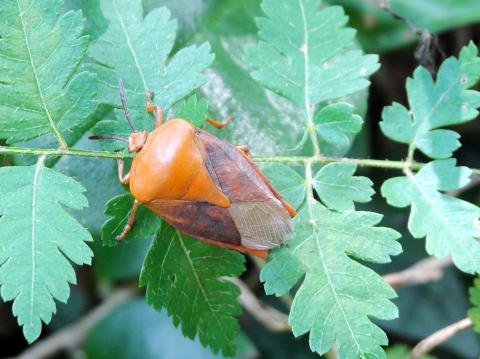Some people have told Taipei City Councilor Kerr Chen that every year, as spring turns into summer, it is common for people to get sprayed with foul-smelling liquid by litchi giant shield bugs, which are in their breeding season at that time. The liquid causes skin allergy and inflammation, which can be very painful. Litchi giant shield bugs being an alien species, some people confuse them with red fire ants and mistakenly report them as such, but despite several such reports, the city government has been passive and not done much about it. It has therefore been suggested that they should issue a “shield bug warning” to inform the public.
The Taipei City Parks and Street Lights Office says that litchi giant shield bugs are an insect pest that has appeared in northern Taiwan in the last two years. They lay their eggs in April and May and are active between May and July. The office says that in future, when the bugs appear, it will put up public information notices to tell people where they are. During the bugs’ egg-laying season in April and May they will pick their egg clumps off trees and destroy them, or else remove the bugs by spraying the trees with water jets. In addition, for places that have experienced relatively heavy litchi giant shield bug infestations, the office will assess the extent of the damage to determine whether insecticide should be sprayed as a preventive measure.
Chang Chan-jung, director of the parks office’s Floriculture Experiment Center, reminds the public not to catch litchi giant shield bugs out of curiosity, so as to avoid getting burned by the liquid that they spray out of their stink glands to defend themselves. Chang also said that people need not be overly fearful of the bugs, they only need to refrain from frightening or provoking them. If people discover such bugs, they can immediately contact the parks office, which will send some of its staff to deal with it.(Liberty Times, translated by Julian Clegg)

Photo courtesy of the Taipei City Parks and Street Lights Office
照片:臺北市公園路燈工程管理處提供
有民眾向台北市議員陳重文陳情,每逢春夏季節交替之時,常遭正值繁殖期的荔枝椿象臭液噴到,造成皮膚過敏紅腫,疼痛不已。因荔枝椿象屬於外來種,還有人誤以為是紅火蟻而誤報,屢次向市府反映,市府卻消極以對。因此有人建議應發布「防疫警報」告知。
臺北市公園路燈工程管理處表示,荔枝椿象為近兩年出現在台灣北部地區的害蟲,產卵期為四至五月,活動期為五至七月;往後荔枝椿象出現時,會在出現地點張貼宣導文宣,並在四至五月間荔枝椿象產卵期摘除樹上卵塊銷毀或利用水柱沖刷移除蟲體。另外,針對荔枝椿象疫情較為嚴重地點,依照危害情形評估是否進行預防性噴藥防治。
公園處花卉試驗中心主任張栴榕提醒,民眾千萬不要因為一時好奇而捉捕荔枝椿象,以免遭到防禦性臭腺汁液灼傷;也不需要過於恐慌,只要不去驚擾牠。如有發現時,可即時通報公園處派員處理。(自由時報記者盧姮倩)

In an effort to fight phone scams, British mobile phone company O2 has introduced Daisy, an AI designed to engage phone con artists in time-wasting conversations. Daisy is portrayed as a kindly British granny, exploiting scammers’ tendency to target the elderly. Her voice, based on a real grandmother’s for authenticity, adds to her credibility in the role. “O2” has distributed several dedicated phone numbers online to direct scammers to Daisy instead of actual customers. When Daisy receives a call, she translates the scammers’ spoken words into text and then responds to them accordingly through a text-to-speech system. Remarkably, Daisy

Bilingual Story is a fictionalized account. 雙語故事部分內容純屬虛構。 Emma had reviewed 41 resumes that morning. While the ATS screened out 288 unqualified, she screened for AI slop. She could spot it a mile away. She muttered AI buzzwords like curses under her breath. “Team player.” “Results-driven.” “Stakeholder alignment.” “Leveraging core competencies.” Each resume reeked of AI modeling: a cemetery of cliches, tombstones of personality. AI wasn’t just changing hiring. It was draining the humanity from it. Then she found it: a plain PDF cover letter. No template. No design flourishes. The first line read: “I once tried to automate my

Every May 1, Hawaii comes alive with Lei Day, a festival celebrating the rich culture and spirit of the islands. Initiated in 1927 by the poet Don Blanding, Lei Day began as a tribute to the Hawaiian custom of making and wearing leis. The idea was quickly adopted and officially recognized as a holiday in 1929, and leis have since become a symbol of local pride and cultural preservation. In Hawaiian culture, leis are more than decorative garlands made from flowers, shells or feathers. For Hawaiians, giving a lei is as natural as saying “aloha.” It shows love and

1. 他走出門,左右看一下,就過了馬路。 ˇ He walked outside, looked left and right, and crossed the road. χ He walked outside and looked left and right, crossed the road. 註︰並列連接詞 and 在這句中連接三個述語。一般的結構是 x, y, and z。x and y and z 是加強語氣的結構,x and y, z 則不可以。 2. 他們知道自己的弱點以及如何趕上其他競爭者。 ˇ They saw where their weak points lay and how they could catch up with the other competitors. χ They saw where their weak points lay and how to catch up with the other competitors. 註:and 一般連接同等成分,結構相等的單詞、片語或子句。誤句中 and 的前面是子句,後面是不定詞片語,不能用 and 連接,必須把不定詞片語改為子句,and 前後的結構才相等。 3. 她坐上計程車,直接到機場。 ˇ She took a cab, which took her straight to the airport. ˇ She took a cab and it took her straight